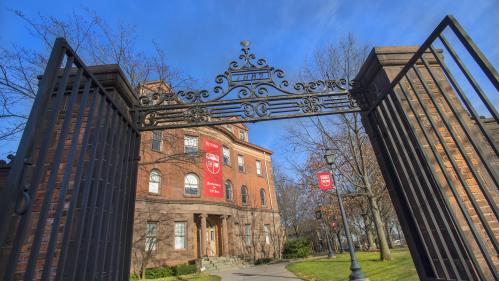
About the Academic Master Plan
Learn about the planning process, steering committee, and how faculty, staff, and students shared feedback.
July–September 2021
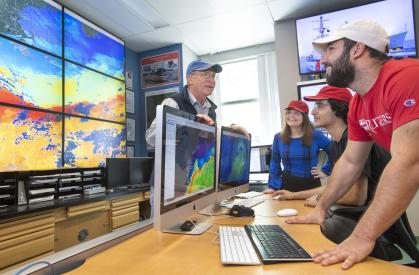
Engage the campus academic leaders in a planning exercise that examines our current academic strengths, weaknesses, opportunities, and threats at the department, school, and campus levels.
- Where are we now - strengths and weaknesses?
- Where do we want to be - opportunities?
- How do we get there - strategy?
August–November 2021: Data Collection to inform Academic Master Plan

Collect data that will help inform the assessment of our current state of affairs and identify our academic priorities, areas for growth in academic programs, and opportunities to make progress in research innovations, inclusive pedagogy and student experience, and public service.
Collect data regarding infrastructure and resource challenges that need to be addressed in order to achieve our goals.
- Goal I: What are our academic priorities?
- Goal II: What academic programs reflect excellence or are on the cusp of excellence and what signature experiences do we want to develop?
- Goal III: How do we make progress in innovative research, inclusive pedagogy and student experience, and public service?
November–January 2022: Establish Academic Priorities and Strategies
- Goal I: Our academic priorities
- Goal II: Propose academic programs reflecting excellence (or are on the cusp of excellence) and signature experiences
- Goal III: Strategies for innovative research, inclusive pedagogy and public service
Spring–Summer 2022: Operationalize the Academic Master Plan
Once the academic priorities and strategies have been finalized, the Academic Master Plan will be shared and discussed with the Rutgers–New Brunswick community.
- How do we operationalize our strategy to accomplish our mission?
Back to Homepage
Scholarly Leadership
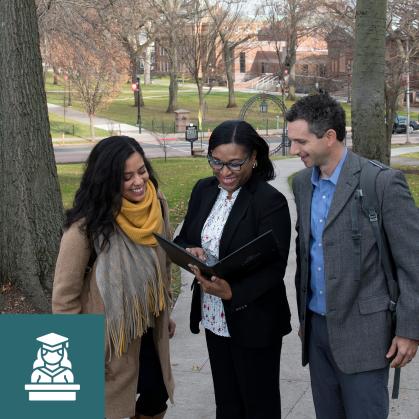
Goal: Elevate scholarly leadership of intellectual communities engaged in a broad variety of cutting-edge research by building collaborative pathways that support the advancement of public good while impacting a diverse population at Rutgers, the state, and globally.
Priorities
- Support intellectual hubs that draw together disciplines/areas of inquiry within Rutgers–New Brunswick
- Develop pathways for exploration that span Rutgers–New Brunswick to improve overall access to our many signature experiences and opportunities
- Improve the infrastructure that supports teaching and research, including addressing technology in the classroom to enable different modes of instruction, building maintenance, development of shared spaces for networking, etc.
Innovative Research
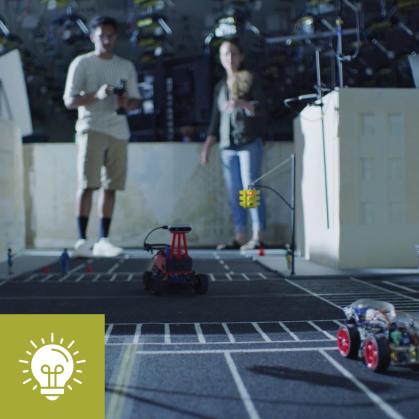
Goal: Strengthen Rutgers’ capacity to solve grand challenges in our community, state, country, and the world, thereby enhancing the impact of our research and scholarship across all areas of inquiry to reflect our commitment to the public good.
Priorities
- Increase the impact of all Rutgers’ research, including interdisciplinary research and community-engaged research
- Increase the equitable representation of all communities in the research process, including the diversity of faculty and access to infrastructure and resources
- Tighten the connection between research and education by strengthening the opportunities for student research at all levels
Student Success

Goal: Transform the student experience to support student belonging, well-being, and success, including preparedness to learn and work in diverse communities across disciplinary differences to contribute to the greater public good.
Priorities
- Create a welcoming and equitable learning environment for all students
- Prioritize on-time graduation with minimal debt for all students
- Expand high-impact learning opportunities, such as internships, research and more, to best prepare students for future success
Discovery Advantage
We're holistically reimagining the student experience—from enrollment to retention and ultimately graduation—to ensure students are supported in their belonging and well-being, and best prepared to succeed in their academic and co-curricular pursuits and life after graduation.
Community Engagement
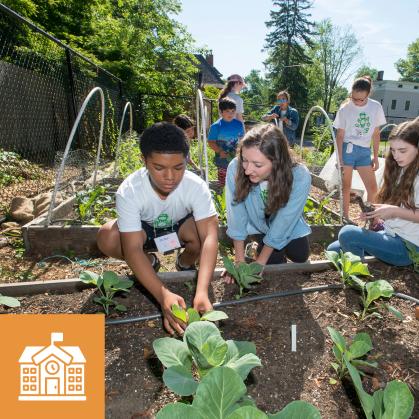
Goal: Formalize Rutgers–New Brunswick’s overarching approach to civic engagement, encourage widespread adoption of community-engaged pedagogy and expand related course offerings, foster public scholarship, and envision ways for students, faculty and staff to engage in community-based priorities.
Priorities
- Develop infrastructure via a distributed model for centrally supported and locally enacted civic engagement initiatives that enable us to better partner across the institution and serve the state
- Integrate community engagement into the student experience via both curricular and co-curricular means
- Incentivize and reward interdisciplinary faculty engagement in civic engagement work in terms of scholarly activity and public engagement and revising policies to recognize it in tenure
Rutgers–New Brunswick defines community engagement as "the collaboration between institutions of higher education and their larger community for the mutually beneficial exchange of knowledge and resources in a context of partnership and reciprocity."
Back to Homepage
Steering and Subcommittee Members By Goals
Accordion Content
Members include faculty, staff, and administrators from across Rutgers–New Brunswick campuses.
-
Goal I: To develop an academic vision statement that reflects our academic priorities and develop a communication plan for the Rutgers–New Brunswick Academic Master Plan.
Steering Committee Co-Chairs
- Jennifer Hollingshead, Rutgers Communications and Marketing
- Peter March, School of Arts and Sciences
- Saundra Tomlinson-Clarke, Office of the Chancellor
Subcommittee Members
- Neal Buccino, Office of the Chancellor
- Sylvia Chan-Malik, School of Arts and Sciences
- Jocelyn Crowley, Edward J. Bloustein School of Planning and Public Policy
- Ingrid Fulmer, Office of the Chancellor
- Ryan Kettler, Graduate School of Applied and Professional Psychology
- Courtney McAnuff, Division of Enrollment Management
- Jonathan Potter, School of Communication and Information
- Jennifer Theiss, School of Communication and Information
- Wade Trappe, School of Engineering
- Andrianni Vollas Viscariello, Rutgers University Foundation
-
Goal II: To develop a plan for sustainable growth in an array of academic programs and disciplinary areas to increase our academic reputation, academic excellence, and signature experiences.
Steering Committee Co-Chairs
- Romayne Botti, University Finance and Administration (Co-Chair Infrastructure Subcommittee)
- Laura Lawson, School of Environmental and Biological Sciences (Co-Chair Signature Programs & Interdisciplinary Collaboration)
Subcommittee Members
- Wanda Blanchett, Graduate School of Education
- Kay Bidle, School of Environmental and Biological Sciences
- Tony Calcado, Institutional Planning and Operations
- Elisabeth Camp, School of Arts and Sciences
- Christopher Cartmill, Mason Gross School of the Arts
- Madhavi Chakrabarty, Rutgers Business School–Newark and New Brunswick
- Sylvia Chan-Malik, School of Arts and Sciences
- Clark Chinn, Graduate School of Education
- Alberto Cuitiño, School of Engineering
- Laura Curran, School of Social Work
- Eric Garfunkel, Rutgers Global Health Institute
- Tina Grycenkov, Office of Institutional Research and Academic Planning
- Paul Hammond, Office of the Chancellor
- Susan Lawrence, School of Arts and Sciences
- Ming Liu, School of Management and Labor Relations
- Michele Norin, Office of the Chief Information Officer
- Richard Novak, Division of Continuing Studies
- Jon Oliver, Information Technology, University Senate
- Anne Piehl, School of Arts and Sciences
- Cathryn Potter, School of Social Work
- Kathleen Scott, School of Arts and Sciences
- Tracey Shors, School of Arts and Sciences
- David Shreiber, School of Engineering
-
Goal III: To develop a pathway for progress through innovative research, inclusive pedagogy and student experience, and public service that impacts the intellectual life of our faculty, students, and staff.
Group A: Innovative Research
Steering Committee Co-Chairs
- Thomas Farris, School of Engineering
- Denise Hien, Office of the Chancellor
- Michael Zwick, Office for Research
Subcommittee Members
- Clint Andrews, Edward J. Bloustein School of Planning and Public Policy
- Melissa Aronczyk, School of Communication and Information
- Jean Baum, School of Arts and Sciences
- Nicole Cain, Graduate School of Applied and Professional Psychology
- Chia-Yi Chiu, Graduate School of Education
- Wendie Cohick, School of Environmental and Biological Sciences
- Rebecca Cypess, Mason Gross School of the Arts
- Ravit Duncan, Graduate School of Education
- Dee Magnoni, New Brunswick Libraries
- Lou Masur, School of Arts and Sciences
- Aaron Mazzeo, School of Engineering
- Tom Prusa, School of Arts and Sciences
- Ronald Ransome, School of Arts and Sciences
- Anand Sarwate, School of Engineering
- Henry Turner, Office of the Executive Vice President for Academic Affairs
Group B: Inclusive Pedagogy & Student Experience
Steering Committee Co-Chairs
- Salvador Mena, Division of Student Affairs
- Carolyn Moehling, Office of the Chancellor
- Henrik Pedersen, School of Graduate Studies
Subcommittee Members
- Stacey Blackwell, Rutgers Learning Centers
- Madhavi Chakrabarty, Rutgers Business School–Newark and New Brunswick
- Kimberly Cook-Chennault, School of Engineering
- Adrienne Eaton, School of Management and Labor Relations
- Gary Gigliotti, Center for Teaching Advancement and Assessment Research
- William Jones, Career and Exploration Success
- Jacquelyn Litt, Douglass Residential College
- Javier Robles, School of Arts and Sciences
- Kristen Syrett, School of Arts and Sciences
Group C: Public Service/Community Engagement
Steering Committee Co-Chairs
- Anna Branch, Office of the Senior Vice President for Equity
- Marybeth Gasman, Rutgers–New Brunswick Faculty Council
- Cathryn Potter, School of Social Work
- Melissa Wooten, Division of Diversity, Inclusion, and Community Engagement
Subcommittee Members
- Emily Allen-Hornblower, School of Arts and Sciences
- Jason Geary, Mason Gross School of the Arts
- Terri Kurtzberg, Rutgers Business School–Newark and New Brunswick
- Jorge Marcone, School of Arts and Sciences
- Donald Schaffner, School of Environmental and Biological Sciences
- Matthew Stone, School of Arts and Sciences
- Vonu Thakuriah, Edward J. Bloustein School of Planning and Public Policy
Back to Homepage
About the Roadmap
Academic Master Plan Workshops
Academic Master Plan Workshop I: Student Success
Hosted on October 12, 2023, this inaugural workshop convened the Rutgers–New Brunswick community to discuss collaborative strategies for transforming the student experience.
Academic Master Plan Workshop II: Innovative Research
Hosted on December 6, 2023, this follow-up workshop continued discussions focused on the second pillar of the Academic Master Plan, Innovative Research. Members of the Rutgers–New Brunswick community gathered to discuss how to strengthen Rutgers' capacity to solve local and global challenges as part of the institution's commitment to the common good.
Academic Master Plan Workshop III: Scholarly Leadership
On February 28, 2024, in the third Academic Master Plan workshop, the Rutgers–New Brunswick community met to discuss ideas on developing scholarly leadership of intellectual communities that bolster a diversity of inquiry in STEM and fostering Rutgers–New Brunswick's commitment to the common good.
Academic Master Plan Final Report: April 27, 2022
Chancellor Francine Conway and the Academic Master Plan Steering Committee presented the Final Report, including details on the four pillars that will contribute to our future success as a university and an overview of next steps for implementation. Students, faculty, and staff are encouraged to read the Final Report.
Academic Master Plan Update: February 22, 2022
Chancellor Francine Conway, members of her leadership team, and the Academic Master Plan Steering Committee shared an update on the Academic Master Planning Process, including a presentation on the four main pillars of the plan and how you can contribute to the future success of the university.
Town Hall October 28, 2021
Chancellor Conway and members of the Academic Master Plan Steering Committee hosted a virtual virtual town hall discussed the Academic Master Plan process, the information collected to date, and how you can ensure your voice is heard as part of this important work.
Town Hall November 30, 2021
Chancellor Conway, members of the Academic Master Plan Steering Committee, and a faculty panel hosted a second virtual town hall to present an update on the project, including emerging themes, introduction of the plan’s goals, and a moderated panel of faculty who shared their perspectives and answered questions.
Academic Master Plan Communications
Announcing Our Implementation of the Academic Master Plan
September 29, 2022
Chancellor-Provost Conway and President Holloway outline new initiatives as work to implement the Academic Master Plan begins.
Rutgers–New Brunswick Academic Master Plan Final Report
April 27, 2022
President Holloway and Chancellor-Provost Conway encourage students, faculty, and staff to watch the virtual town hall on the Academic Master Plan Final Report, and to read the Final Report on our Academic Master Plan website.
Announcing the Rutgers–New Brunswick Academic Master Plan
September 7, 2021
Chancellor-Provost Conway presents an overview of the Academic Master Plan process and encourages input from students, faculty, and staff.
A Message From Chancellor-Provost Francine Conway
July 7, 2021
Students, faculty, and staff are encouraged to connect with Chancellor-Provost Conway and share questions, insights, and concerns.
Academic Master Plan Surveys
Past Surveys
The success of the Rutgers–New Brunswick Academic Master Plan (NB-AMP) depends on the collaboration and input from our Rutgers–New Brunswick community.
The NB-AMP Steering Committee has collected feedback from faculty, staff, and students who shared their thoughts and ideas via online surveys. The committee has also gathered data, interviewed stakeholders, and discussed many facets of our strengths, weaknesses, opportunities, and challenges.
Academic Master Plan Faculty/Staff Survey
More than 1,500 faculty and staff responded to the survey.
The survey, which was open from November 3–November 19, 2021, invited faculty and staff to provide their perspective on the current NB-AMP proposal and questions, and submit suggestions.
Academic Master Plan Student Survey
More than 2,400 students responded to the survey.
The survey, which was open from November 17–December 3, 2021, invited students to share feedback about their academic experience at Rutgers, support in and out of the classroom, career and professional development, and other topics.
Back to Homepage
Implementation Overview
Rutgers–New Brunswick's Academic Master Plan is designed to transform the higher education landscape, rallying faculty, students, and staff from across the university community to bring its mission to life.
Implementation Teams and Responsibilities
Accordion Content
-
The Academic Master Plan Oversight Committee is charged with monitoring the overall progress of the Plan's implementation.
Committee Responsibilities
- Tell the Rutgers–New Brunswick Academic Master Plan story
- Update the Rutgers–New Brunswick Community on Academic Master Plan progress
- Host town halls to provide updates on each pillar of the Academic Master Plan
-
The Executive Implementation Committee assures implementation of the Academic Master Plan in each of the local units, identifying and fostering cross-unit collaborations.
Committee Responsibilities
- Review the Academic Master Plan Action Plan
- Develop Academic Master Plan success metrics
- Monitor progress and create and activate frameworks for accountability
-
The Implementation Committee is charged with ensuring the effective implementation of the Plan across the campuses.
Committee Responsibilities
- Reviews implementation plan
- Encourages cross-campus collaboration
- Identifies gaps in the implementation plan
- Advises the Office of the Chancellor on areas for improvement
- Serves as ambassadors for the plan
To learn more about how these committees interact on the implementation of the Academic Master Plan, review the Academic Master Plan implementation process framework.
Back to Homepage

